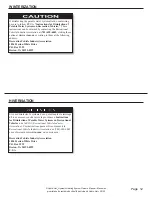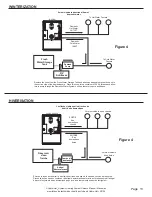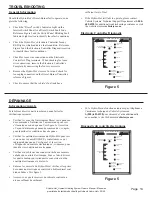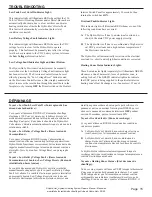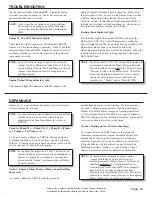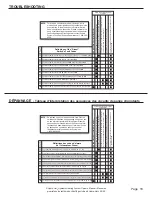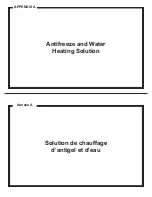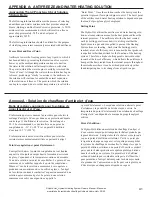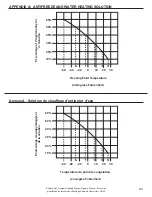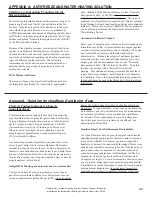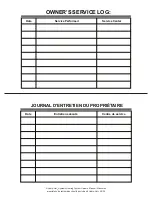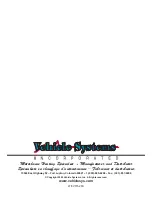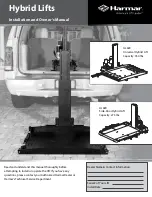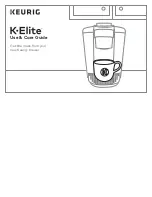
© Hydro-Hot
®
Hydronic Heating System Owner’s Manual / Manuel du
proprié
taire du système de chauffage Hydronic Hydro-Hot
®
09/05
A4
Selecting an Appropriate Propylene Glycol
Based Antifreeze
The following information addresses the necessary usage of a
propylene glycol based “boiler” type antifreeze in the Hy-
dro-Hot. Propylene glycol is a safer alternative to the more
toxic ethylene glycol antifreeze; however, as mandated by
IAPMO (International Association of Plumbing and Mechani-
cal Officials), only those propylene glycol based “boiler” type
antifreezes deemed “Generally Recognized as Safe” (GRAS)
by the FDA should be utilized.
Because of the significant impact various types of antifreeze
can have on a Hydronic Heating System, including the level
of safety provided, it has been recognized that there is a need
to provide an explanation regarding two additional prominent
types of antifreeze/coolant available. The following
information should be utilized as an educational means of
ensuring that the proper type of propylene glycol based
antifreeze is selected:
RV & Marine Antifreeze:
These types of propylene glycol based antifreeze products
are formulated specifically for “winterizing” applications
only. Although RV & Marine antifreeze is often “Generally
Recognized as Safe” by the FDA, it should never be used
in the Hydro-Hot’s Hydronic Heating System. This type of
antifreeze is not formulated to transfer heat, which is essential
to the Heating System’s functionality and does not contain rust
inhibitors. Please note, however, that RV & Marine antifreeze
can be utilized to winterize the Hydro-Hot’s Domestic Hot
Water Heating System.
Automotive Antifreeze/Coolant:
These types of propylene glycol based antifreeze products are
formulated specifically to protect automotive engines against
corrosion, freezing temperatures, and overheating. They also
have excellent heat transfer and thermal conductivity
characteristics. Although these types of antifreeze products
are considered less toxic and safer than ethylene glycol for
people, pets, and the environment, they are not “Generally
Recognized as Safe” (GRAS) rated by the FDA. Therefore,
they must be marked with a “harmful if swallowed”
warning. This additional warning is required because these
types of antifreeze products contain high levels of chemical
rust inhibitors. Due to their potentially hazardous properties,
they should never be used in the Hydro-Hot’s Hydronic Heat-
ing System.
APPENDIX A: ANTIFREEZE AND WATER HEATING SOLUTION
Choix de l’antigel approprié à base de
propylèneglycol :
L’information qui suit explique la nécessité d’un antigel de
type chaudière à base de propylèneglycol dans le Hydro-Hot.
Le propylèneglycol est plus sécuritaire que l’éthylène glycol
qui lui, est plus toxique. Tel que demandé par L’
IAPMO
(International Association of Plumbing and Mechanical
Officials)
, seuls les antigels de type chaudière à base de
propylèneglycol généralement reconnus inoffensifs par la
FDA
devraient être utilisés.
À cause des répercutions importantes que peuvent avoir les
divers types d’antigel sur le système Hydronic Hydro-Hot,
incluant le niveau de sécurité fourni, il a été cru nécessaire de
fournir ici des explications sur deux autres types d’antigel bien
connus. L’information devrait être utilisée pour renseigner sur
le sujet afin d’assurer que le type approprié d’antigel à base de
propylèneglycol est bien choisi :
Antigel RV & Marin (pour autocaravane et service marin)
Ces types d’antigel à base de propylèneglycol sont conçus
pour hiveriser seulement. Même si ces antigels sont souvent
reconnus généralement inoffensifs par la
FDA
, ils ne devraient
jamais être utilisés dans le système de chauffage Hydronic
Hydro-Hot. Ce type d’antigel n’est pas conçu pour transporter
de la chaleur, ce qui est pourtant essentiel au fonctionnement
du système de chauffage et il ne contient pas d’inhibiteurs
de corrosion. Notez cependant que ce type d’antigel peut
être utilisé pour hiveriser le système de chauffage d’eau
domestique du Hydro-Hot.
Liquide antigel / de refroidissement d’automobile :
Ces types d’antigel à base de propylèneglycol sont formulés
spécifiquement pour protéger les moteurs contre la corrosion,
le gel et la surchauffe. Ils ont aussi une bonne capacité de
transfert de chaleur et de conductivité thermique. Même si ces
antigels sont considérés moins toxiques que l’éthylène glycol
pour les personnes, les animaux et l’environnement, ils ne
sont pas reconnus généralement inoffensifs par la FDA. Par
conséquent, ils doivent porter la mention d’avertissement
« dangereux si ingéré ». Cet avertissement est nécessaire parce
que ces types d’antigel peuvent contenir de grandes quantités
d’inhibiteurs de rouille chimiques. À cause de leurs propriétés
potentiellement dangereuses, ils ne devraient jamais être
utilisés dans le système de chauffage Hydronic Hydro-Hot.
Annexe A : Solution de chauffage d’antigel et d’eau




